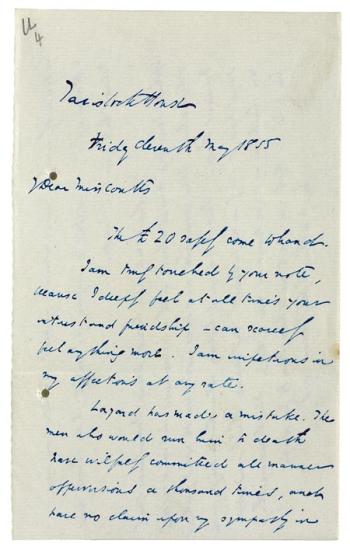
Autograph letter signed, London, 11 May 1855, to Angela Burdett Coutts
Purchased with the assistance of the Fellows, 1951
Dickens came of age, professionally, as a political reporter at the time of the first Parliamentary Reform Act in 1832. He distrusted and despised most politicians, and once referred to the House of Commons as "that great Dust Heap down at Westminster." His own political position was broadly reformist, his main concern being the improvement of people's standards of living and the efficiency of government. In this letter he states his political faith: "The people will not bear for any length of time what they bear now.... For this reason solely, I am a Reformer heart and soul. I have nothing to gain—everything to lose (for public quiet is my bread)—but I am in desperate earnest, because I know it is a desperate case."
Philanthropy
From 1840 Dickens guided the charitable work of philanthropist Angela Burdett-Coutts (1814–1906), the wealthiest heiress in Victorian Britain. Dickens served as her official almoner and helped to assess the merits of the thousands of letters she received from those seeking financial assistance. He also advised on her plan for improved sanitation in the slums of Westminster and drew her attention and support to the Ragged School Union, which provided education to London's poorest children. A pragmatist, Dickens encouraged Burdett-Coutts to direct her philanthropy toward the causes of distress. In 1847 they founded a home, Urania Cottage, in Shepherd's Bush, as a shelter for homeless women—prostitutes or petty criminals who sought to rehabilitate themselves by learning practical skills and developing self-discipline. Many of the women were assisted to eventually emigrate to one of Britain's colonies to begin a new life. For more than ten years, Dickens administered Urania Cottage on behalf of Burdett-Coutts and played an extremely active role in its day-to-day management.
My Dear Miss Coutts
The £20 safely come to hand.
I am truly touched by your note, because I deeply feel at all times your interest and friendship—can scarcely feel anything more. I am impetuous in my affections at any rate.
Layard has made a mistake. The men who would run him to death have wilfully
committed all manner of perversions a thousand times, and have no claim upon my sympathy in
